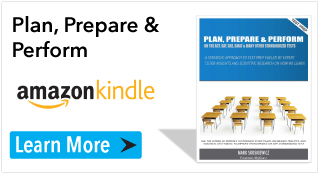Finding a good tutor is not easy (we can help with that!), but once you've found someone who works well with you, there are some things you can do to get even more out...
How to Study More Effectively

Quality over quantity. It’s an often-used, and generally helpful, notion. However, when it comes to studying, two points need to be made:
- It’s surprisingly difficult to put your finger on the level of “quality” of the study session you just engaged in and…
- ...to become really good at something, you of course need both quality and quantit
This post offers practical ideas for helping your child improve his or her ability to study material, comprehend concepts, and retain information. It’s about getting better at the studying process. It draws from psychology, a little neurology, and of course education research, as well as my personal experiences studying, tutoring, and operating a tutoring company. Sharing some of the information you gain from this post with your child should help him or her be happier, more successful, and less stressed throughout high school and college.
First, let’s note that “natural talent” or "raw intelligence" matters less than you might think.
Dozens of studies have shown that the key to building skills in any domain and becoming an expert, including athletics, music, and mathematics, is a concept called deliberate practice. There are many books that have discussed this research, and you can check out a few of the most notable ones here. Deliberate practice is high quality practice, and done in large quantities, is what generally explains what many people inaccurately perceive as “natural talent” in any given academic or non-academic domain.
Many experts believe strongly that the best way to explain how and why someone, for example, is able to obtain a PhD in Mathematics, would be to surmise that they enjoyed the subject and engaged in a large number of hours of deliberate practice to build their skills. They were curious. They focused with passion on learning more and uncovering the why and how of mathematical reasoning.
Perhaps something was slightly genetically different about their neurological make up early on that helped them gain the slightest of edges in thinking about math, but it was probably quite small. More importantly, they were just interested, and engaged with the topic. As their math skills grew, and they performed better relative to their peers, they continued to pursue the subject. Most of us do not have this experience with math, and so people tend to explain why and how someone obtains a PhD in Mathematics by saying things like “he’s a math person” or “he has a natural talent for math.” In other words, the average person places too much weight on genetics as an explanation for ability in math and science.
If your child currently struggles with math (or reading comprehension, or science, or anything else), they should know that with focused effort and deliberate practice they can steadily build their skills and improve.
The other kids who seem to “just get it” are in fact, most likely, spending a lot of time studying and practicing behind the scenes. And, most likely, they are doing so deliberately.
So what does it mean to study deliberately?
It’s important to understand that, while any practice is probably better than no practice, the quality of your practice matters a lot. Deliberate Practice is about achieving a high level of focus, full engagement, and immediate feedback when practicing any given type of skill. It involves hard work, but requires much more than hard work.
In a few bullets, you could say it’s characterized by:
- Shifting from a focus on completion to true understanding. You aren’t trying to finish, you’re trying to understand fully
- Recognizing the need to be incredibly focused. That means no distractions (i.e., no cell phones, TV, computers, etc.)
- Striving for complete understanding of basic concepts in any given area before moving on to something more complex.
- Breaking skills down to their component pieces, looking for patterns in the building blocks of what makes one problem easy, the next a little harder, and the most difficult ones the trickiest to master.
- Receiving immediate feedback to cement ideas in your mind. You may not be able to have a personal tutor available, but simply doing 10-20 problems and reviewing what you missed immediately is better than doing 40 problems and waiting a week to review your answers
- Being focused on giving every problem your full mental effort, even (especially) those that are very difficult. Pushing yourself to the limits of what you are currently capable of is another key dimension of the skill building process.
- Being mentally tiring. You might even call it exhausting. Just as your muscles are tired after lifting weights and your heart is beating fast after running a mile, your brain should feel as if it’s had a workout after true deliberate practice…
- Not lasting more than 1-2 hours (given that it’s an intense process). This implies that, if you are going to spend, just as an example, six hours preparing for a test, you should break that down into 3-5 study sessions, not one marathon prep session.
When you are practicing deliberately, you focus on mastering core concepts at their most basic level. You break the subject down into the smallest component pieces possible, you might call them “manageable chunks,” and then steadily attempt to understand and master more difficult concepts and problems.
One of the most important elements of deliberate practice is full engagement and ownership over the solutions you arrive at while practicing or studying. You must avoid the temptation to open the book and read how to get to the solution unless you are definitely lost and don’t know what to do. It is a dangerous habit to open the book and read the solution, and in so doing, form a belief that you understand the problem or concept when, in fact, you really don’t.
Struggling with content in real-time and trying to work out solutions in your head is what builds connections between neurons in your brain, and in turn these connections combine to enhance your skill level in any given domain. By “giving up” too quickly and simply reading about how to answer a problem, you are much less effective in building those neurological connections. When you don’t do a problem yourself, but instead you read how to do it, you are likely to fall victim to what is called the “illusion of competence.” When reading the problem, you get it. But, without the book as a crutch, you’d find that you really do not understand the concep
About the Author
Mark Skoskiewicz founded MyGuru, in 2009. MyGuru acquired Viking Tutors in late 2014. He completed, with Distinction, the University of California at San Diego Coursera course Learning How to Learn: Powerful Mental Tools to Help you Master Tough Subjects, and has been featured on Fox News 32 Good Day Chicago (talking about the new SAT) and popular blogs like The College Solution and Mindset Works.

